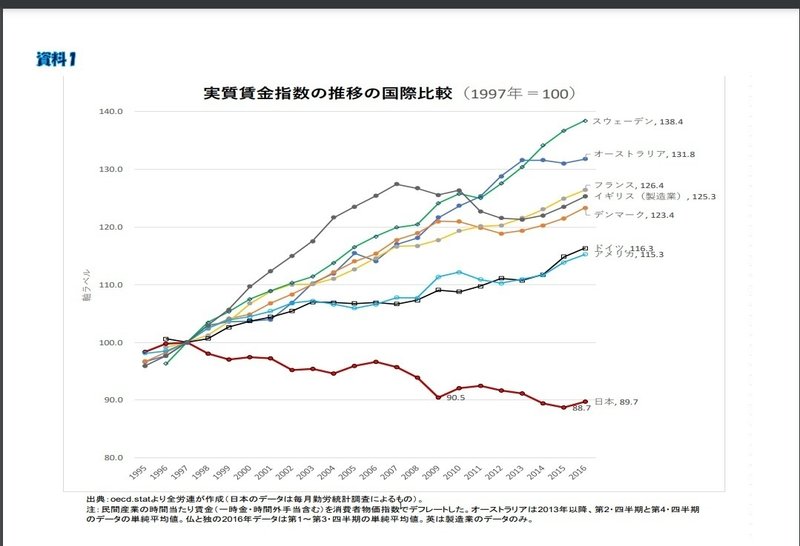日本のビジネスはオワコンなのか?日本の学歴もオワコンなのか?
日本経済、つまり日本のGDPは、約30年間成長していません。その間、アメリカ合衆国や中国は経済成長してきました。日本は、ついに、GDPでドイツに抜かれてしまい、世界4位になりました。そのため、日本経済・日本のビジネスは「オワコン」とも言われています。
そんな、日本でしか通用しない学歴(東大、京大、一橋、東工大、早慶)にこだわっても無意味なのではないか?という主張も、一定程度は妥当性がありそうです。ハーバード大学やスタンフォード大学、MITなどに行ったほうがいいのではないか?と。
これについて、論じたいと思います。
まず、年収ですが、確かに日本では平均年収も高年収層の年収も、平成の頃からほとんど増えていません。業界によってはむしろ減っているところも多いでしょう。GDPは三面等価の原則があり、「生産=所得=支出」が成り立つため、GDPが増えないということは労働者の所得も増えないのは当然です。日本の平均年収は約440万円であるのに対して、アメリカ合衆国の平均年収は、約1300万円となります(出所:アメリカ労働統計局 Bureau of Labor Statistics)。当然、為替レートが今は円安なので、もし仮に2/3したとしても、約866万円であり、為替レートを差し引いてもアメリカの年収の高さが際立っています。アメリカの一流大学を卒業して普通のホワイトカラーとして働けば、20代で年収1000万円はもらえるわけです。これは、東大を卒業して日本の一流企業に勤務するのが虚しくなるレベルの格差ですね。
ちなみに「アメリカは日本よりもインフレなので、物価上昇で所得も増加しているだけだ」という反論がありそうなので、その反論を粉砕してあげましょう。

実質賃金、つまり、物価上昇を差し引いて計算しても、日本の賃金は90年代の89%くらいなのに対して、アメリカは115%程度になっています。オーストラリアに至っては、131%に増加しています。インフレを差し引いても、日本だけが先進国で所得が減っている状況なのです。年収だけを考えたら、「日本で働くよりも、欧米先進国で働いたほうが得」と言えそうです。
そして、欧米先進国で働くには、日本の大学よりも海外の大学のほうがいいのは当たり前のことでしょう。よって、ハーバード大学>>>東大など、とも言えそうです。
ただし、アメリカは、かつてよりはマシになってきているとはいえ、まだまだ、白人中心の社会です。アジア人が出世するのは厳しいです。また、日本とは違って、実力を発揮できない社員はすぐに解雇されます。日本は、解雇が難しい国なので、安定して働きやすいです。しかし、そのことを踏まえても、やはりアメリカで働くほうがメリットが大きいと考えます。一度、アメリカの一流企業で働いたことがある人材は、日本に帰国しても転職先は多いでしょう。
もちろん、友人や知人、家族のいない異国の地で働くのは、精神的にタフでないと厳しいでしょう。そこまでして、アメリカで働く覚悟がある人は、アメリカで働けばよいと思います。
Title: Challenges and Opportunities in the Japanese Economy: A Comparative Analysis
Introduction: Japan, despite its technological prowess and historical economic success, has faced a prolonged period of stagnant economic growth, with its GDP remaining largely unchanged for approximately 30 years. This stands in stark contrast to the economic expansions witnessed in the United States and China over the same period. Recently, Japan was surpassed by Germany in GDP rankings, now holding the fourth position globally. Consequently, there is a prevailing sentiment that the Japanese economy and business landscape are on the decline, often described as "オワコン" or "finished."
Educational Background and Global Perspectives: A growing discourse questions the relevance of an education system fixated on prestigious domestic universities such as the University of Tokyo, Kyoto University, and others. Is it futile to insist on these credentials when considering the global landscape? The argument suggests that pursuing education at institutions like Harvard, Stanford, or MIT might offer more promising prospects. This viewpoint will be explored in depth in the following discussion.
Income Disparities and Real Wages: Examining income, it is evident that average and high-income brackets in Japan have seen minimal growth since the Heisei era. Some industries have even experienced a decline in earnings. The threefold equilibrium principle of GDP - "production equals income equals expenditure" - highlights that stagnant GDP leads to stagnant incomes for workers. Comparatively, the average annual income in Japan is around ¥4.4 million, whereas in the United States, it stands at approximately ¥13 million, even after adjusting for the exchange rate. The disparity becomes more pronounced when considering that a white-collar worker graduating from a top-tier American university can earn around ¥10 million in their 20s, creating a substantial income gap when compared to their Japanese counterparts.
Debunking Inflation Arguments: Addressing the potential counterargument that the United States has higher inflation, leading to increased incomes, a focus on real wages (adjusted for inflation) unveils a different narrative. Japan's real wages hover around 89% of the 1990s levels, while the United States has experienced an increase to approximately 115%. Australia, in particular, has witnessed a remarkable surge to 131%. Even after accounting for inflation, Japan appears to be the only advanced economy where real incomes are on the decline.
Global Employment Dynamics: Considering the desirability of working in Western advanced economies, the narrative shifts to the advantage of foreign universities over Japanese institutions. It follows that Harvard University would be considered far superior to the University of Tokyo. However, working in the United States comes with its challenges, including a historically white-centric corporate culture, making career advancement challenging for Asians. Additionally, unlike the Japanese labor market, the U.S. labor market tends to swiftly terminate underperforming employees. Despite this, the essay contends that the benefits of working in the U.S. outweigh the challenges, and individuals with experience in top American companies often find ample job opportunities upon returning to Japan.
Conclusion: In conclusion, the Japanese economy faces significant challenges, reflected in its prolonged economic stagnation. The discourse on educational backgrounds and global perspectives introduces the idea that a shift towards foreign education, particularly in the United States, may offer enhanced career opportunities. However, it is essential to recognize the complexities of global employment dynamics and the trade-offs involved in pursuing opportunities abroad. As Japan navigates these challenges, a comprehensive understanding of its economic intricacies will be crucial for individuals making career and educational decisions in the evolving global landscape.
この記事が気に入ったらサポートをしてみませんか?
